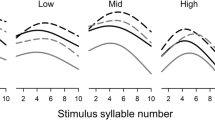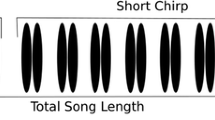Abstract
Behavioral plasticity can occur on multiple timescales, from traits fixed during development to traits that remain plastic throughout an individual’s lifetime. Because mate choice is a key factor in determining selection on male ornaments, understanding the timescale of plasticity in female choice behavior is critical to understanding how this plasticity influences selection. Experience of sexual signals during both the juvenile and adult stages often shapes mating behavior, but the relative importance of experience during each stage is unclear. Does mate preference become fixed during development or does it remain plastic throughout adulthood? We manipulated the perceived social environment of female Pacific field crickets (Teleogryllus oceanicus) by exposing them to either song or silence during the juvenile and adult stages. Exposure to song during the adult stage significantly decreased measures of responsiveness to calling song, while experience of calling songs during the juvenile stage resulted in a suggestive but non-significant reduction in measures of responsiveness. Mate choice behaviors of adult female crickets are therefore predicted to track changes in their environments’ fluctuating demographics, and this plasticity may have important evolutionary implications.


Similar content being viewed by others

References
Auld JR, Agrawal AA, Relyea RA (2010) Re-evaluating the costs and limits of adaptive phenotypic plasticity. Proc R Soc B Biol Sci 277:503–511. doi:10.1098/rspb.2009.1355
Bailey NW, Zuk M (2008) Acoustic experience shapes female mate choice in field crickets. Proc R Soc London, Ser B 275:2645–2650. doi:10.1098/rspb.2008.0859
Bailey NW, Gray B, Zuk M (2010) Acoustic experience shapes alternative mating tactics and reproductive investment in male field crickets. Curr Biol 20:845–849. doi:10.1016/j.cub.2010.02.063
Ball EE, Oldfield BP, Rudolph KM (1989) Auditory Organ Structure, Development, and Function. In: Huber F, Moore TE, Loher W (eds) Cricket Behav. Neurobiol. Cornell University Press, Ithaca, pp 391–422
Brenowitz EA, Beecher MD (2005) Song learning in birds: diversity and plasticity, opportunities and challenges. Trends Neurosci 28:127–132. doi:10.1016/j.tins.2005.01.004
DeWitt TJ, Sih A, Wilson DS (1998) Costs and limits of phenotypic plasticity. Trends Ecol Evol 13:77–81
DiRienzo N, Pruitt JN, Hedrick AV (2012) Juvenile exposure to acoustic sexual signals from conspecifics alters growth trajectory and an adult personality trait. Anim Behav 84:861–868. doi:10.1016/j.anbehav.2012.07.007
Fowler-Finn KD, Rodriguez RL (2011) Experience-mediated plasticity in mate preferences: mating assurance in a variable environment. J Evol Biol 66:459–468. doi:10.5061/dryad.1cc18
Fowler-Finn KD, Rodríguez RL (2012) The evolution of experience-mediated plasticity in mate preferences. J Evol Biol 25:1855–1863. doi:10.1111/j.1420-9101.2012.02573.x
Ghalambor CK, McKAY JK, Carroll SP, Reznick DN (2007) Adaptive versus non-adaptive phenotypic plasticity and the potential for contemporary adaptation in new environments. Funct Ecol 21:394–407. doi:10.1111/j.1365-2435.2007.01283.x
Gotthard K, Nylin S (1995) Adaptive plasticity and plasticity as an adaptation: a selective review of plasticity in animal morphology and life history. Oikos 74:3–17
Kasumovic MM, Brooks RC (2011) It’s all who you know: the evolution of socially cued anticipatory plasticity as a mating strategy. Q Rev Biol 83:181–197
Kasumovic MM, Hall MD, Try H, Brooks RC (2011) The importance of listening: juvenile allocation shifts in response to acoustic cues of the social environment. J Evol Biol 24:1325–1334. doi:10.1111/j.1420-9101.2011.02267.x
Kasumovic MM, Hall MD, Try H, Brooks RC (2012) Socially cued developmental plasticity affects condition-dependent trait expression. Behav Ecol 24:429–434. doi:10.1093/beheco/ars180
Klowden M (2013) Physiological systems in insects, 3rd edn., p 696. doi:10.1016/B978-0-12-415819-1.00001-5
Kooi RE, Brakefield PM (1999) The critical period for wing pattern induction in the polyphenic tropical butterfly Bicyclus anynana (Satyrinae). J Insect Physiol 45:201–212. doi:10.1016/S0022-1910(98)00093-6
Marler P (1970) A comparative approach to vocal learning: song development in white-crowned sparrows. J Comp Physiol Psychol Monogr 71:1–25
Mason AC, Faure PA (2004) The physiology of insect auditory afferents. Microsc Res Tech 63:338–350. doi:10.1002/jemt.20050
Michie LJ, Masson A, Ware RL, Jiggins FM (2011) Seasonal phenotypic plasticity: wild ladybirds are darker at cold temperatures. Evol Ecol 25:1259–1268. doi:10.1007/s10682-011-9476-8
Nijhout HF (1994) Insect Hormones. Princeton University Press, Princeton
Nylin S, Gotthard K (1998) Plasticity in life-history traits. Annu Rev Entomol 43:63–83
Pascoal S, Cezard T, Eik-Nes A et al (2014) Rapid convergent evolution in wild crickets. Curr Biol 24:1369–1374
Price TD, Yeh PJ, Harr B (2008) Phenotypic plasticity and the evolution of a socially selected trait following colonization of a novel environment. Am Nat 172(Suppl):S49–62. doi:10.1086/588257
Rebar D, Zuk M, Bailey NW (2011) Mating experience in field crickets modifies pre- and postcopulatory female choice in parallel. Behav Ecol 22:303–309. doi:10.1093/beheco/arq195
Tinghitella RM, Weigel EG, Head M, Boughman JW (2013) Flexible mate choice when mates are rare and time is short. Ecol Evol 3:2820–31. doi:10.1002/ece3.666
Wagner WEJ, Smeds MR, Wiegmann DD (2001) Experience affects female responses to male song in the variable field cricket Gryllus lineaticeps (Orthoptera, Gryllidae). Ethology 107:769–776
West-Eberhard MJ (1983) Sexual selection, social competition, and speciation. Q Rev Biol 58:155–183
West-Eberhard MJ (2003) Developmental plasticity and evolution. Oxford University Press, New York
Zuk M, Rotenberry JT, Tinghitella RM (2006) Silent night: adaptive disappearance of a sexual signal in a parasitized population of field crickets. Biol Lett 2:521–524. doi:10.1098/rsbl.2006.0539
Zuk M, Bastiaans E, Langkilde T, Swanger E (2014) The role of behaviour in the establishment of novel traits. Anim Behav. doi:10.1016/j.anbehav.2014.02.032
Acknowledgments
MZ is supported by the University of Minnesota and National Science Foundation grant 1261575. We also thank Susan Balenger, Elizabeth Bastiaans, Justa Heinen-Kay, Ruth Shaw, Emilie Snell-Rood, Marla Spivak, and several undergraduates, especially Paul Swim, and the editors of the Journal of Insect Behavior and two anonymous reviewers for insightful comments.
Compliance with Ethical Standards
All work described here complies with ethical guidelines for the use of invertebrates, and the authors have no conflicts of interest to declare.
Author information
Authors and Affiliations
Corresponding author
Rights and permissions
About this article
Cite this article
Swanger, E., Zuk, M. Cricket Responses to Sexual Signals are Influenced More by Adult than Juvenile Experiences. J Insect Behav 28, 328–337 (2015). https://doi.org/10.1007/s10905-015-9504-6
Revised:
Accepted:
Published:
Issue Date:
DOI: https://doi.org/10.1007/s10905-015-9504-6



